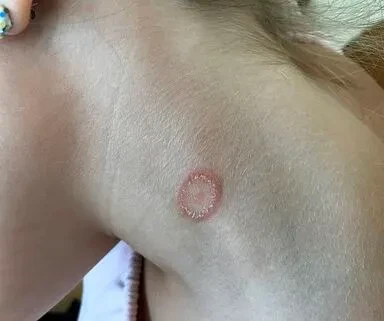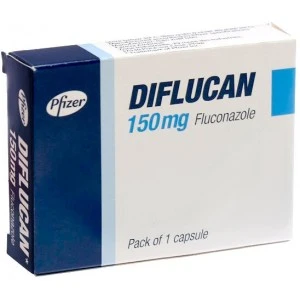Ringworm, despite the name, is not linked to worms at all. Instead, it is a fungal skin infection caused by dermatophytes. Also known as 'jock itch', the infection causes an unpleasant, itchy rash on the skin. If you currently have ringworm or jock itch, you're likely wondering how long it lasts and what to do about it.

Firstly, how do you know you have ringworm? The symptoms include an itchy ring-shaped rash on the skin. The skin may be dry and flaky. In some cases, it may cause sores or lesions on the skin. Ringworm can affect any part of the body, including the abdomen, limbs and back.
Jock itch is the name given to a ringworm infection located on the groin, buttocks or inner thighs. While jock itch can cause a rash around the genital area, it doesn't usually cause symptoms to develop on the genitals themselves. Men are more susceptible to jock itch than women. This is likely due to moisture becoming trapped between the scrotum and the thighs, creating the ideal environment for the fungi to grow.
Ringworm can also develop on the hands; in this case, it may appear much like athlete's foot (thick, scaly skin, sometimes with open sores).
If you have a fungal skin infection in two places, such as jock itch and athlete's foot at the same time, then you must treat them both simultaneously. This is because fungal skin infections can spread from one part of your body to another.
The good news is that there are several steps you can take to treat ringworm and alleviate the uncomfortable symptoms it causes. Here, we'll help you understand how long a ringworm infection lasts (both with and without treatment) and how to reduce the chances of getting it again. Read on to find out more.
Does Ringworm Go Away On Its Own?
The short answer is yes - ringworm can eventually go away on its own. However, this can take anywhere from a few weeks to a few months.
Not seeking treatment for a ringworm or jock itch infection can cause you to experience unnecessary itching and discomfort throughout the entire time you have the infection.
Moreover, there is no guarantee that it will actually go away. Therefore, it's best to get the right treatment for ringworm as soon as you notice it, rather than leaving it to go away on its own. Treatments can also prevent you from passing the fungal infection on to others.
How Long Is Ringworm Contagious?
The unfortunate thing about ringworm is that you can have it and not experience any symptoms, making it harder to spot and much easier to pass to others. It can take up to 14 days for the symptoms to develop.
Ringworm is spread through direct contact with fungal spores or infected skin. The latter mode of transmission may be easiest to deal with by simply avoiding physical contact with the infected area. However, the fungal spores can live on clothing, bedding, sofa cushions, and other porous surfaces.
Like most fungi, ringworm infections thrive in warm, moist environments, such as locker rooms and showers. Therefore, anyone who might sit on the same sofa, pick up clothing to wash it, or even use the same shower could become infected. Fungal spores can survive on surfaces in warm, damp areas for more than a year.
However, in general terms, if you have treatment for ringworm, you will only be contagious for approximately 48 hours.
It is also possible to catch ringworm from pets, including dogs, cats, rabbits and birds. Plus, pets can catch ringworm from humans. Interestingly, although you can pass ringworm to and from a pet, if you catch ringworm from a pet, you cannot then pass it to another human. Make sure to wash your hands thoroughly after touching your pet, and take them to the vet if you suspect they may have ringworm.
How Long Does It Take To Get Rid Of Ringworm?
In most cases, ringworm will clear up within about 4 weeks with treatment, although this may vary from person to person and depends on the severity of the infection. The more serious the infection, the longer it will take to go.
There are various treatments available for fungal skin infections.
Daktarin (miconazole) and Canesten (clotrimazole) are available over the counter from pharmacies and even some supermarkets. A pharmacist can discuss your symptoms and the available treatments with you, allowing you to choose the most suitable one.
If over-the-counter treatments are ineffective, consult your doctor. They may be able to prescribe stronger antifungal treatments, such as Terbinafine - available as a topical cream or oral tablets, or Diflucan (fluconazole) tablets.
Diflucan
- Effective antifungal treatment
- Treats a number of fungal infections
- Eligible for next-day delivery
Terbinafine
- Directly kills fungus
- Available as cream or tablets
- Short course of treatment
Consult your doctor to determine the most suitable treatment for your specific needs. While treatments are available over the counter at pharmacies, more severe infections may require stronger medications that are only available by prescription.
If seeing your doctor is inconvenient for you, Prescription Doctor's discreet online service can help you get the ringworm or jock itch treatment you need delivered straight to your door.
Regardless of the treatment you use, it is essential to continue using it for the prescribed duration, just as you would with antibiotics.
Even if you think the infection has cleared up, it may still be present. Therefore, you must continue treatment as your doctor instructed. If you stop too early, your ringworm infection could return. Similar to bacterial infections, fungal infections can develop a resistance to treatment, making it harder to treat an infection with the same antifungal at a later date.
If you think you have ringworm, the best thing to do is to speak to a doctor for a diagnosis, after which they can discuss treatment options available to you. Since you can purchase some ringworm creams over the counter, it's also worth consulting a qualified pharmacist for advice.
What Can You Do To Prevent Ringworm From Spreading?
If you have ringworm and want to minimise the risk of passing it on to someone else, here are some steps you can take.
Avoid touching the rash
While the urge to scratch the area of itchy skin can be tempting, doing so can cause further damage to the area and may increase your chances of spreading the infection. Topical treatments, such as creams and ointments, can help to relieve the sensation of itching and prevent you from scratching.
You may need to touch the rash when applying a treatment to it. However, you must remember to wash your hands after using such products.
Wash surfaces regularly
As we've already established, the fungi thrive in warm, damp environments and can live on surfaces for longer than 12 months. Washing clothes, bedding and other surfaces that may have come into contact with the affected areas of skin can help to prevent the infection from spreading.
The CDC recommends washing clothes on a hot wash and using bleach on applicable surfaces to kill the fungus.
Keep the infected area clean and dry
As with any skin infection, it's important to keep the area clean to prevent further infection.
Wash the area with a gentle soap and dry the area thoroughly with a clean towel. Dab the towel over the area to prevent irritation that would otherwise come from rubbing the area dry.
After using the towel to dry the area, wash it as soon as possible.
Following these steps can help prevent the infection from spreading to others and aid in its quick treatment.







